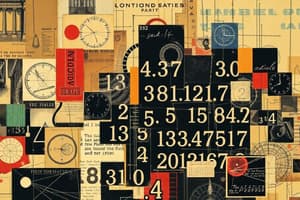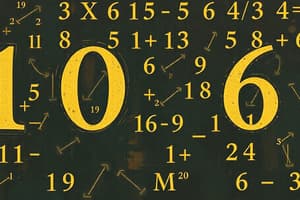Podcast
Questions and Answers
What is the foundation of calculus that describes the behavior of functions as the input approaches a particular value?
What is the foundation of calculus that describes the behavior of functions as the input approaches a particular value?
- Functions
- Limits (correct)
- Integrals
- Derivatives
Which of the following measures is NOT a part of descriptive statistics?
Which of the following measures is NOT a part of descriptive statistics?
- Median
- Hypothesis testing (correct)
- Mode
- Mean
What is the primary purpose of using integrals in calculus?
What is the primary purpose of using integrals in calculus?
- To define limits of a function
- To solve algebraic equations
- To accumulate change over an interval (correct)
- To find the instantaneous rate of change
Which of the following represents a coordinate system used to study geometrical relationships?
Which of the following represents a coordinate system used to study geometrical relationships?
What is the significance of probability in statistics?
What is the significance of probability in statistics?
Which of the following sets includes all natural numbers?
Which of the following sets includes all natural numbers?
What is the result of the expression $5(3 + 2) - 4$ using order of operations?
What is the result of the expression $5(3 + 2) - 4$ using order of operations?
Which of the following is an example of an irrational number?
Which of the following is an example of an irrational number?
What type of equation can be represented by a parabola on a graph?
What type of equation can be represented by a parabola on a graph?
Which arithmetic operation involves finding the difference between two quantities?
Which arithmetic operation involves finding the difference between two quantities?
In geometry, which property relates to the total area within the boundaries of a shape?
In geometry, which property relates to the total area within the boundaries of a shape?
Which of these describes complex numbers?
Which of these describes complex numbers?
Which of the following operations is defined as repeated addition of a quantity?
Which of the following operations is defined as repeated addition of a quantity?
Flashcards
Coordinate geometry
Coordinate geometry
Using an x-y plane to represent shapes and analyze their relationships.
Limits in calculus
Limits in calculus
Analyzing how a function behaves as its input gets closer to a specific value.
What are Derivatives?
What are Derivatives?
The rate at which a function changes at a given point.
Data analysis
Data analysis
Signup and view all the flashcards
Probability
Probability
Signup and view all the flashcards
Natural Numbers
Natural Numbers
Signup and view all the flashcards
Integers
Integers
Signup and view all the flashcards
Rational Numbers
Rational Numbers
Signup and view all the flashcards
Irrational Numbers
Irrational Numbers
Signup and view all the flashcards
Real Numbers
Real Numbers
Signup and view all the flashcards
Complex Numbers
Complex Numbers
Signup and view all the flashcards
Addition
Addition
Signup and view all the flashcards
Subtraction
Subtraction
Signup and view all the flashcards
Study Notes
Fundamental Concepts
- Mathematics is a formal system of logic and reasoning used to investigate quantities, structures, space, and change.
- It encompasses various branches like arithmetic, algebra, geometry, calculus, and statistics.
- Key concepts include sets, numbers (natural, integers, rational, irrational, real, complex), operations (addition, subtraction, multiplication, division), functions, equations, and inequalities.
Number Systems
- Natural numbers (ℕ): Counting numbers, starting from 1 (1, 2, 3,...).
- Integers (ℤ): Includes natural numbers, zero, and negative counting numbers (... -3, -2, -1, 0, 1, 2, 3,...).
- Rational numbers (ℚ): Numbers that can be expressed as a fraction p/q, where p and q are integers and q ≠ 0. Examples include 1/2, -3/4, 5.
- Irrational numbers: Numbers that cannot be expressed as a fraction of two integers. Examples include π and √2.
- Real numbers (ℝ): The set of all rational and irrational numbers.
- Complex numbers (ℂ): Numbers of the form a + bi, where a and b are real numbers, and i is the imaginary unit (i² = -1).
Arithmetic Operations
- Addition: Combining two or more quantities.
- Subtraction: Finding the difference between two quantities.
- Multiplication: Repeated addition of a quantity.
- Division: Finding how many times one quantity is contained within another.
- Order of operations (PEMDAS/BODMAS): A set of rules for evaluating mathematical expressions, specifying the sequence of operations (Parentheses/Brackets, Exponents/Orders, Multiplication and Division, Addition and Subtraction).
Algebra
- Variables and expressions: Using symbols (variables) to represent unknown quantities and combinations of variables and constants (expressions).
- Equations and inequalities: Statements that assert equality or inequality between two expressions.
- Solving equations: Finding values of variables that satisfy equations.
- Polynomials: Expressions consisting of variables and coefficients.
- Factoring: Expressing polynomials as a product of simpler expressions.
- Linear equations: Equations that can be represented by a straight line on a graph.
- Quadratic equations: Equations that can be represented by a parabola on a graph.
Geometry
- Shapes and figures: Study of two-dimensional and three-dimensional figures (points, lines, angles, triangles, circles, etc.).
- Properties of shapes: Investigating specific traits of shapes such as perimeter, area, and volume.
- Measurement: Estimating lengths, areas, and volumes.
- Coordinate geometry: Using coordinate systems (x-y plane) to represent shapes and study geometrical relationships.
Calculus
- Limits: Foundation of calculus, describes the behavior of functions as the input approaches a particular value.
- Derivatives: Rate of change of a function.
- Integrals: Accumulated change of a function.
- Applications of calculus: Used in physics, engineering, and economics to model and solve problems involving change.
Statistics
- Data collection: Process of gathering information.
- Data analysis: Interpreting and organizing information.
- Descriptive statistics: Describing data using measures like mean, median, mode, and standard deviation.
- Inferential statistics: Drawing conclusions about a population based on a sample.
- Probability: The measure of the likelihood of an event occurring.
Studying That Suits You
Use AI to generate personalized quizzes and flashcards to suit your learning preferences.
Description
Explore the foundational principles of mathematics, including its branches such as arithmetic, algebra, and calculus. This quiz covers key concepts including various number systems like natural, integers, rational, irrational, real, and complex numbers. Test your understanding of operations, functions, equations, and inequalities.




